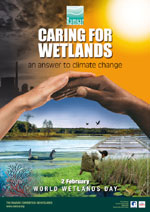World Wetlands Day 2010: Caring for Wetlands - an Answer to Climate Change

Bonn, 2 February 2010 - World Wetlands Day WWD
is being celebrated around the world today
under the theme “Wetlands, Biodiversity and Climate
Change”. This annual event marks the date of the signing
of the Convention on Wetlands on 2 February 1971 in the
Iranian city of Ramsar and represents a unique opportunity
to raise awareness about the importance of wetlands around
one central theme each year.
This year’s theme, “Wetlands,
Biodiversity and Climate Change” and the associated
slogan “Caring for Wetlands: an Answer to Climate
Change” highlight the impact of climate change on
wetland ecosystems and the role wetlands play in climate
change mitigation and adaptation.
“This year’s theme […]
captures the sense of urgency we all feel about the need
to address the potentially disastrous consequences of global
climate change as quickly as possible, particularly in the
wake of the Copenhagen meeting […], and it emphasizes
our belief that the role of wetlands in mitigating and adapting
to the effects of climate change must be central in all
future debates about the way forward.” said Anada
Tiega, Secretary General of the Ramsar Convention on Wetlands
in his message for World Wetlands Day 2010.
The WWD
theme also links up to this year’s United
Nations International Year of Biodiversity 2010 by highlighting
wetlands as one of the world’s most diverse ecosystems
rich in biodiversity.
“Like tropical forests and coral
reefs, wetlands are one of the most productive ecosystems
in the world. They are an important habitat for an immense
variety of species ranging from micro-organisms to plants,
insects, amphibians, reptiles, mammals and many birds.”
said Elizabeth Maruma Mrema, the Executive Secretary of
the Convention on Migratory Species. “World Wetlands
Day is a chance to celebrate the amazing diversity of species
dependent on wetlands. At the same time it is also an opportunity
to showcase the many other important functions wetlands
provide.” said Mrema.
In addition to hosting many species, wetlands,
such as peatlands, marshes, floodplains, mangrove forests
and lakes also offer many ecosystem services, provide food,
fibre, shelter and drinking water. They function as natural
water filters and act as sponges absorbing surplus volumes
of water in heavy rainfalls while giving it back slowly
in periods of drought. As such, they have a water regulating
and storage function which can serve as natural protection
against flooding, droughts and storms.
Unfortunately, wetland systems are very
vulnerable to changes in both the quality and quantity of
their water supply and it is expected that climate change
will cause additional wetland shrinkage, next to drainage,
upstream dams or pollution. The loss of wetlands, accelerated
by climate change will also affect the many species that
depend on wetlands as their habitat.
“Migratory waterbirds are particularly
vulnerable because of their use of wetland habitats during
migration as stopover sites for feeding, resting or to sit
out bad weather.” said Mr. Bert Lenten, Executive
Secretary of the African-Eurasian Waterbird Agreement (UNEP/AEWA).
The loss and destruction of wetlands will compound other
effects of climate change faced by migratory waterbirds
such as changes in relative timing of food supply, more
extreme weather conditions and shifts in their breeding
and wintering range.
World Wetlands Day 2010 will help to provide
a sense of how wetland biodiversity can be adversely affected
by climate change, but also highlight the importance of
robust biological diversity in maintaining the wetlands’
ability to provide the ecosystem services, in the face of
climate change effects, upon which we all depend.
For more information please visit:
-
World Wetlands Day 2010 Website (Ramsar Secretariat) - WWD
2010 Announcement: Wetlands International - WWD
2010 Announcement: BirdLife International
-
AEWA
Publication: Migratory Waterbirds and Climate Change
(PDF Document) - CMS
Publication: Climate Change Impacts on Migratory Species
- The Path Ahead (PDF Document)
Last updated on 16 June 2014


